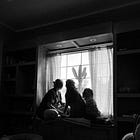START HERE: I’m not really an optimist
Why I'm attempting a fresh start (and my unlikely journey into hope)
I have a confession to make: I’m not really an optimist.
In fact, I’m a lifelong catastrophiser, glass-half-empty, chronic overthinker. As far back as I can remember, it’s been me vs. my brain.
My relationship with optimism began with a breast cancer diagnosis at age 29. Less than a year earlier, my childhood best friend, Emily, had also been diagnosed. I found myself following in her footsteps—down a path neither of us chose.
Nightmares and panic attacks consumed me, my fear of recurrence always present. But nothing could have prepared me for what came next. Emily’s cancer returned, and just after her 30th birthday, she died. I felt like the map of my life had been ripped in two.
Grief and survivor’s guilt hit me harder than treatment ever had. I couldn’t see a future free of my pain. And, for a long time, I felt unworthy of recovery.
But even in my despair, hating myself for surviving felt like betraying Emily—and the second chance I’d been given. I began asking myself what it might take to truly heal. I soon realised it would require something unfamiliar: an attempt at self-love.
Here’s the funny thing: for someone so anxious, I’ve always taken bold leaps. For years, I trained for a career in musical theatre—until an unfortunately timed virus made me miss my stage school auditions. So I pivoted, pursuing singing instead, moving from one college to another when I thought the curriculum would be better.
I married the love of my life at 25 and moved to Los Angeles with him without ever even visiting the city. Moving to another country without knowing a soul should have terrified me—but instead, I saw it as an adventure.
If these aren’t the actions of an optimist, I don’t know what are. And yet, at some point, I’d stopped taking chances and started getting in my own way.
In the wreckage of so much loss, I began to look at things differently. What if I treated hope as a daily effort—an attempt, not a destination?
What if, despite my brain’s wiring, I started practising optimism on purpose?
How could I ever forgive myself for ‘staying alive’ if I couldn’t find a way to like—or even love—myself?
The truth was, there was nothing inherently wrong with me. I was a good, kind person who’d spent a lifetime believing the wrong story—that I was somehow broken, less worthy than others.
It took time to unlearn that story—through writing, revising my life on the page, sentence by sentence. The more I showed up to write, the more my self-belief grew—and slowly, almost without realising, I began to build a life with purpose.
These days, optimism isn’t a feeling I wake up with. It’s something I practise through writing, connection, and continuous effort, even when I’d rather give up.
Yes, maybe my cancer will return one day. Maybe my life will be cut short, like my beautiful friend’s. But if I let fear stop me from taking chances, what was the point of surviving at all? So I’m asking myself—what else is possible if I only try?
I’ve attempted courage.
I’ve attempted self-love.
Now, I’m attempting to show up until I finally believe in myself.
And that’s what Attempts at Optimism is all about. Not toxic positivity, but approaching life’s plot twists with curiosity, compassion, and a stubborn kind of hope.
It’s a space for all of us anxious try-hards who crave honesty over sanitised perfection.









"What if I treated hope as a daily effort—an attempt, not a destination?"
This line really struck me. It reframes hope not as something we either have or don't, but as a verb, something we actively do. It’s easy to get caught up in the idea that we should always be hopeful, but the reality is that sometimes, we need to work at it. And perhaps that daily work, that conscious effort, is what makes hope all the more meaningful. It becomes a choice, a commitment to ourselves, rather than just a feeling. Love it 🩵
I don’t think people remain static over their lives. I’ve been more of an optimistic at times, a pessimist at others, a realist during a lot of times. Maintaining optimism in today’s world though isn’t an easy feat. It’s an everyday choice for most people that they have to make over and over again in spite of evidence challenging their viewpoint